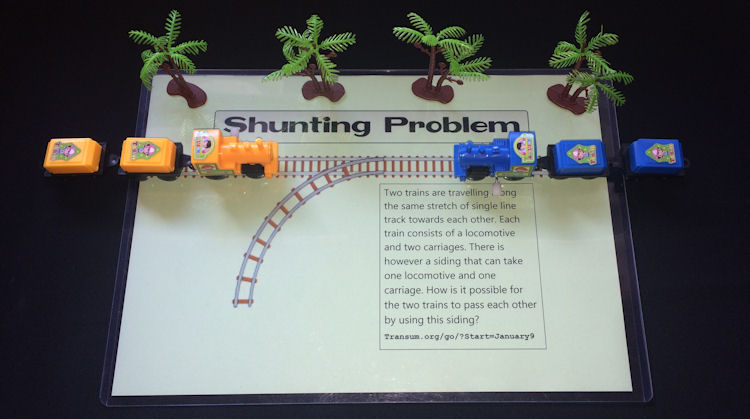


Two trains are travelling along the same stretch of single line track towards each other. Each train consists of a locomotive and two carriages. There is however a siding that can take one locomotive and one carriage. How is it possible for the two trains to pass each other by using this siding?
Topics: Starter | Creativity | Fun | Logic | Multiple Intelligences | Problem Solving
How did you use this starter? Can you suggest
how teachers could present or develop this resource? Do you have any comments? It is always useful to receive
feedback and helps make this free resource even more useful for Maths teachers anywhere in the world.
Click here to enter your comments.
Previous Day | This starter is for 9 January | Next Day
Sign in to your Transum subscription account to see the answers
Your access to the majority of the Transum resources continues to be free but you can help support the continued growth of the website by doing your Amazon shopping using the links on this page. Below is an Amazon link. As an Amazon Associate I earn a small amount from qualifying purchases which helps pay for the upkeep of this website.
Educational Technology on Amazon
|
Change the background of this page to
or
for clearer classroom display.
|
||

|
Teacher, do your students have access to computers such as tablets, iPads or Laptops? This page was really designed for projection on a whiteboard but if you really want the students to have access to it here is a concise URL for a version of this page without the comments: Transum.org/go/?Start=January9 However it would be better to assign one of the student interactive activities below. |
|
Here is the URL which will take them to a related student activity.
If you have scrolled this far down the page you may well be interested in our collection of Classic Shunting Puzzles which are fascinating, enjoyable and adictive!

Teacher: If you have young children of your own borrow their toy trains and use these printable train tracks for a real hands-on experience (small plastic trees not included).